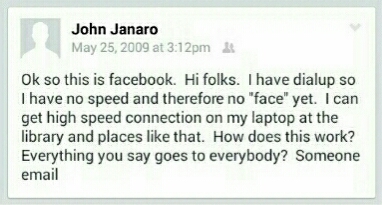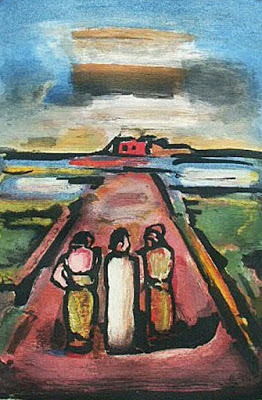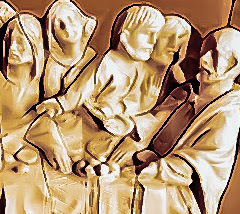John Janaro's Blog, page 184
May 26, 2018
Facebook: I've Been Friends With Myself for Nine Years!
Nine years ago yesterday, I made my very first post on Facebook. (I was hardly a trendsetter.) Here's a "throwback" to those days:
.

Haha, how funny: "Everything you say goes to everybody?" Yes. Yes, it does. You have no idea how true that is. "Someone email..." hmm, what? Where did the rest of that sentence go? I think there used to be a word limit on Facebook.
.
Word limit ...maybe they should bring that back.
.

Haha, how funny: "Everything you say goes to everybody?" Yes. Yes, it does. You have no idea how true that is. "Someone email..." hmm, what? Where did the rest of that sentence go? I think there used to be a word limit on Facebook.
.
Word limit ...maybe they should bring that back.
Published on May 26, 2018 19:03
Facebook: I've Been Friends With Myself for Nine Years!
Nine years ago yesterday, I made my very first post on Facebook. (I was hardly a trendsetter.) Here's a "throwback" to those days:
.

Haha, how funny: "Everything you say goes to everybody?" Yes. Yes, it does. You have no idea how true that is. "Someone email..." hmm, what? Where did the rest of that sentence go? I think there used to be a word limit on Facebook.
.
Word limit ...maybe they should bring that back.
.

Haha, how funny: "Everything you say goes to everybody?" Yes. Yes, it does. You have no idea how true that is. "Someone email..." hmm, what? Where did the rest of that sentence go? I think there used to be a word limit on Facebook.
.
Word limit ...maybe they should bring that back.
Published on May 26, 2018 19:03
Facebook: I've Been Friends With Myself for Nine Years!
Nine years ago yesterday, I made my very first post on Facebook. (I was hardly a trendsetter.) Here's a "throwback" to those days:
.

Haha, how funny: "Everything you say goes to everybody?" Yes. Yes, it does. You have no idea how true that is. "Someone email..." hmm, what? Where did the rest of that sentence go? I think there used to be a word limit on Facebook.
.
Word limit ...maybe they should bring that back.
.

Haha, how funny: "Everything you say goes to everybody?" Yes. Yes, it does. You have no idea how true that is. "Someone email..." hmm, what? Where did the rest of that sentence go? I think there used to be a word limit on Facebook.
.
Word limit ...maybe they should bring that back.
Published on May 26, 2018 19:03
Facebook: I've Been Friends With Myself for Nine Years!
Nine years ago yesterday, I made my very first post on Facebook. (I was hardly a trendsetter.) Here's a "throwback" to those days:
.

Haha, how funny: "Everything you say goes to everybody?" Yes. Yes, it does. You have no idea how true that is. "Someone email..." hmm, what? Where did the rest of that sentence go? I think there used to be a word limit on Facebook.
.
Word limit ...maybe they should bring that back.
.

Haha, how funny: "Everything you say goes to everybody?" Yes. Yes, it does. You have no idea how true that is. "Someone email..." hmm, what? Where did the rest of that sentence go? I think there used to be a word limit on Facebook.
.
Word limit ...maybe they should bring that back.
Published on May 26, 2018 19:03
May 23, 2018
Where Do Wars and Violence Come From?
 "Peace and Security, Number 2" (2018, digital)We live in a "Global Village" that is growing smaller, in a sense, as the 21st Century moves forward.
"Peace and Security, Number 2" (2018, digital)We live in a "Global Village" that is growing smaller, in a sense, as the 21st Century moves forward.When Marshall McLuhan, the noted philosopher of media, coined this term over fifty years ago, he was well aware of its ambivalence.
It certainly was not meant as a guarantee that we were all going to become one big happy family on planet earth. Indeed, it doesn't require much consideration to recognize that the smaller the village, the easier it is to burn the whole thing down. As for being one big family, well... families have fights too.
Will we ever get this business of "being human" right?
I have been thinking about all this while pondering some of the readings from the liturgy this week. The Letter of James is a particularly challenging text in the New Testament. James's exhortations are blunt, direct, and sometimes have a bit of a sting to them.
He's not trying to be rude. Rather, he's hitting hard because he wants to puncture our bubbles of self-deception. He's trying to tell us things we'd rather not hear.
James shines a revealing light on the places in our lives where we tend to feel 'good' about ourselves. He shows us sins where we think we have virtues, pettiness and weakness where we feel great and strong.
James aims at our pride, and its external expressions of arrogance, envy, oppression, and the illusion that we are masters of reality by our own power.
"Where do the wars and where do the conflicts among you come from? Is it not from your passions that make war within your members? You covet but do not possess. You kill and envy but you cannot obtain; you fight and wage war. You do not possess because you do not ask" (James 4:1-2).War.
Certainly we have the right (even the duty) to defend ourselves and our civil communities from violence perpetrated against us, if necessary by means of physical force.
But it's so easy to rationalize the degeneration of legitimate force into violence. Even when we have good reason to defend ourselves and protect our communities, how often we end up pursuing revenge or taking advantage of the opportunity to plunder, degrade, and dehumanize the aggressor and everything associated with them.
Thus instead of seeking justice and reconciliation, we respond to aggression with force beyond the bounds of reason and honor, forgetful of the dignity of persons, and without mercy. We turn conflict toward our own selfish advantage and to the pursuit of power.
Violence begets more violence.
The wars that nations fight against one another correspond to all the "less political" kinds of violence that divide peoples, communities, families, and all kinds of relationships.
 James tells us that war is rooted in our own hearts, in our "disordered passions," our envy, and our self-aggrandisement.
James tells us that war is rooted in our own hearts, in our "disordered passions," our envy, and our self-aggrandisement.It's important to remember that human passions—the spontaneous inclinations that arise within us—are not bad in themselves. They belong to the fullness of being human. But our instincts and drives come to fruition only insofar as they are shaped to respond according to the goodness of reality, and integrated within our intelligence and freedom as guided by the wisdom and grace of God.
When we neglect to live in the freedom of God's children, we can become slaves to the powers of this world. The drives, urges, and fears of our frail humanity are so easily manipulated. We find ourselves caught up in the rivalries, the lusts, and the confusion of narrow and superficial spectacles of power that are unworthy of our humanity and that ultimately oppose us to one another.
We fall apart in dissipation and we tear each other apart in pursuit of ideologies and illusions.
This does not bring us freedom. It brings us violence. It always leads to violence.
The violence is only more destructive when we don't see it, when we ignore it, when we become accustomed to it.
We should remember that it's easy to trick ourselves into thinking that we have life "under control." We think we live reasonably contented, disciplined lives and that we are disposed to be benevolent or at least tolerant of others.
We are surrounded by humanly constructed environments that meet our physical needs and comforts in a way that almost seems spontaneous. We think we are peaceful people, when in fact most of us are merely distracted or shielded from the conflict that rages around us and in us.
It's difficult to believe that we are part of this "war." After all, we don't hunger for power. We think we have all the power we need. We presume on the solidity of all the unprecedented power within our reach as we proudly and calmly map out the course of our lives.
James has another reminder for us about this. To all of us who think we have power and boast about our big plans for the future, he says:
"You have no idea what your life will be like tomorrow. You are a puff of smoke that appears briefly and then disappears. Instead you should say, 'If the Lord wills it, we shall live to do this or that'" (James 4:14-15).Of course, it's reasonable to plan, to dream, to aspire to accomplish things in the future—according to God's will, according to the wisdom and love that has created and redeemed us.
 This is neither a superstition nor a mere manner of speaking. It is the perspective of faith that lives by hope and love—the perspective of living our lives in relationship with God. He is the only source of the peace, confidence, and strength that endures and prevails.
This is neither a superstition nor a mere manner of speaking. It is the perspective of faith that lives by hope and love—the perspective of living our lives in relationship with God. He is the only source of the peace, confidence, and strength that endures and prevails.His power is the power of Eternal Love. He has come to share life with us so that we might be empowered to love Him and one another...so that we might be free.
Published on May 23, 2018 20:21
May 22, 2018
The Courage to Keep Living and Working
 Georges Rouault (1871-1958), Road to EmmausI would feel quite desperate writing about human persons and relationships if I thought we had to depend on our own fragile natural powers to generate a lasting human community.
Georges Rouault (1871-1958), Road to EmmausI would feel quite desperate writing about human persons and relationships if I thought we had to depend on our own fragile natural powers to generate a lasting human community.History has demonstrated again and again our stubborn selfishness and attachment to narrow interests that frustrate the aspiration for justice and solidarity.
But our hope rests in something greater than this present age, the promise of the glory of Eternal Love.
And our hope begins now, because this Love has entered our history, and He has already begun the transformation of our lives. Life has meaning now, because God has come to dwell with us. He has come to be our companion in our world, in our hearts, within our relationships. He wants to be with us, to renew our strength, and to bring us to a fulfillment beyond all our limits and all our measure.
By faith, with hope, in the charity poured out into our hearts by the Holy Spirit, we discover a new reason to love our neighbor, and even to love our enemy with a love that endures all things: Jesus is here.
Jesus is our neighbor. And we long for His love to be everything to every person. He brings everything to its fullness. And so we find the courage to keep living, to keep working, to let His love define us, to never give up.
.
"Faith, hope and charity go together.
"Hope is practised through the virtue of patience, which continues to do good even in the face of apparent failure, and through the virtue of humility, which accepts God's mystery and trusts him even at times of darkness.
"Faith tells us that God has given his Son for our sakes and gives us the victorious certainty that it is really true: God is love!
"It thus transforms our impatience and our doubts into the sure hope that God holds the world in his hands and that, as the dramatic imagery of the end of the Book of Revelation points out, in spite of all darkness he ultimately triumphs in glory.
"Faith, which sees the love of God revealed in the pierced heart of Jesus on the Cross, gives rise to love.
"Love is the light—and in the end, the only light—that can always illuminate a world grown dim and give us the courage needed to keep living and working. Love is possible, and we are able to practise it because we are created in the image of God. [We are invited] to experience love and in this way to cause the light of God to enter into the world."
~Benedict XVI, Deus Caritas Est 39
Published on May 22, 2018 20:45
May 20, 2018
Pentecost 2018
Pentecost is more than just a day.
It's a whole new life!
It's a whole new life!
Published on May 20, 2018 18:58
May 19, 2018
Human Relationships: Getting Beyond the "Autonomous Self"
 "Love, not hate!" Everybody talks about love today.
"Love, not hate!" Everybody talks about love today.People agree that "loving others" is a fundamental attitude worth striving for. We are determined to be a loving, caring society. And this determination is earnest and sincere.
People try hard to love others. People do so many good things, make so many sacrifices, and dedicate themselves to programs of action for spreading love all through the world.
This results in some astonishing and inspiring achievements.
Still, the world we live in is full of hate. It is saturated with violence on every level of human interaction. Violence tinges all of us not only externally but also in our own hearts.
Who among us is not in some way affected by fear, selfishness, or resentment?
We inevitably face limitations in the world, in others, and within ourselves. Our aspirations to be loving people are frustrated and sometimes diverted down distorted paths that lead to new forms of violence and hatred.
Real love is a hard and dreadful thing compared to love in our dreams. Its relentless demands can so easily make cowards of us all.
It doesn't help when we try to become loving persons by the energy of our own freedom conceived as an autonomous, self-defining force—a demiurge of self-fulfillment that we expect to coalesce with everyone else's self-defined ideas and impulses, and thereby somehow produce a wonderful harmony of love and understanding among us all.
We want love to work like magic.
Such is the expectation of the easy "love in our dreams" that is inevitably overwhelmed by the stubbornness of real persons and the slow, difficult, inescapable path of life as it is truly given to us. Real personal life can only flourish interpersonally; persons are fulfilled only through being-in-relationship with other persons.
Though everybody talks about love today, our society is stuck within an ideological and interactive framework of individualism. Too often, the very ideal of "love" in our society is reduced to a kind of "plan" of necessary or mutually satisfying engagements with one another that entail a minimum of commitment and risk. This shriveled form of love consists in isolated acts of assistance or benevolence between essentially solitary people who are afraid to be coinvolved in one another's lives, as persons, in freedom and relationship.
We want to satisfy ourselves according to our own autonomous self-definition, and then "help others" insofar as we choose to do so. Certainly, we want to respond to the suffering of others that stirs up our feelings of sorrow, and we hope that overall we will be very generous in our choices to help others. Most of us, after all, feel that it's important to be "loving people."
But still we want our relationships with others to be radically controlled by us and subject to our autonomy. We are afraid of the "letting-go," and indeed even the unmanageable and sometimes seemingly chaotic "leaping-into-the-dark" that are involved in living wholehearted relationships. But we must face the reality that we are not autonomous. We are in fact made to be together and entrusted to one another.
We depend on one another in reality. That is why, no matter how much we want to be "free" (in the sense of "free-from-relationship-with-others-as-intrinsic-to-the-path-to-our-destiny"), those other persons who have been given to us (our "neighbors") never seem to fit into the schemes we want to impose on them. They remain involved with "who we are," and we cannot escape being open and vulnerable to one another.
Thus, we cannot seal ourselves off in a self-contained, fully adequate, autonomous "capsule" that we imagine might protect us from the risk of love. Insofar as we try to live this delusion, we will only succeed in hating and hurting real people: others and ourselves.
We are persons called ineradicably to live in communion with other persons. We are called to give and receive love, on a path of life that involves a lot of preference, initiative, and choosing on our part, but that also involves openness and responsiveness to what has been given to us.
We don't radically determine our own lives and identity. Our creativity and freedom belong not only to our initiatives, but also to our cooperation, our openness to the freedom of others, our courtesy and hospitality, our gratitude, our solidarity and compassion, our willingness to forgive, and even our suffering.
How can we move beyond the crippling, violence-engendering fear of living as fully human persons? How can we discover that the apparent limitations that challenge us in our being-together-with-others are in reality the great spaces that open us up to the fulfillment of our existence as persons, the fulfillment of real freedom?
...to be continued...
Published on May 19, 2018 20:53
May 17, 2018
Worthy is the Lamb
As we prepare for the celebration of Pentecost, I will continue to use Paschal symbolism to engage in creative experiments with graphics.
Worthy is the Lamb who was slain.... He died and rose from the dead so that we might live a new life in the Spirit. Come Holy Spirit!

Worthy is the Lamb who was slain.... He died and rose from the dead so that we might live a new life in the Spirit. Come Holy Spirit!

Published on May 17, 2018 15:00
May 16, 2018
Human Relationships: Are "Scraps From the Table" Enough?
 The basis of human relationships is the fact of being persons and "being-together." When we forget or seek to evade this foundation, the things we try to do to help others remain shallow and don't reach their most crucial and essential needs.
The basis of human relationships is the fact of being persons and "being-together." When we forget or seek to evade this foundation, the things we try to do to help others remain shallow and don't reach their most crucial and essential needs.Indeed, they don't do justice to their humanity.
Not that our "actions" and efforts to meet people's needs are not important, but their specific human value is founded on "presence" and expresses presence.
If we're not (in some way) trying to care for the whole scope and depth of people's needs, to enrich their lives, to help them grow as persons, to defend their rights, and to seek ways to rectify the injustice and oppression that hold them down, we are clearly not "present" with them in an appropriate, meaningful human relationship.
We are not "together-with-them" in solidarity if we don't do what we can to help them in an integral fashion. For Christians, it's always useful to refresh the memory on this point by revisiting epistle of James (see e.g. 2:14-16: "if you see a brother or sister in need, etc...")
External actions in service to our neighbor, when they are possible within the circumstances of a relationship, are a necessary expression of interpersonal communion. They are not, however, sufficient in their material and perceivable form for the constitution of the relationship itself.
Let us consider how this applies in broad terms of human societal relations, keeping in mind that the same dynamic applies analogously to relationships, responsibilities, and needs of every kind.
Thus we know that we can address the needs of hungry people by feeding them and housing them. But we must do so in a human way. Circumstances may require that emergency priority be given to addressing the most proximate physical needs of people in desperation, and at first it may only be possible to give them the basic care necessary for protection and sustenance.
But we must not allow our concern to drift after a crisis is met, lest the marginal and precarious status of people in need becomes a long term, diminished condition of life. We must feed them, but we cannot be satisfied with this alone, with the fact that the people at the gates of our cities are not dying of hunger. The immediate physical needs of human beings are inextricably bound up with more profound exigencies proper to their value as bodily and spiritual persons.
Consider that we can also "address the needs" of chickens by feeding them and providing appropriately spacious, safe, dry shelter. (And let us note that all God's creatures have a proper value and dignity and deserve the respect due to them.)
We do not, however, have interpersonal relationships with chickens.
There are fundamental differences between persons and non-personal creatures that are evident by the way societies throughout history have considered them.
Though there is clearly something that can be (and was meant to be in God's original plan for creation) beautiful and mysterious in the interaction and even collaboration between humans and animals, it does not constitute interpersonal communion (this is a truth that Genesis 2 teaches us).
The care we consider sufficient and benevolent for chickens and even pets would be considered criminal and dehumanizing as a standard of care for humans.
People from impoverished or war-ravaged countries, who are forced to prioritize their basic needs of physical survival, have said about first-worlders: "Their dogs live better than we do!"
This is a provocation and a cry against injustice. These people do not mean to imply that their lives would be adequate and their humanity respected if they were just treated like European or American dogs.
In Jesus's relevant parable on this point (Like 16:19-31), we see that the dogs eat the scraps that fall from the rich man's table. Lazarus longs just to be able to eat those scraps as he lies starving by the gate. And though the scraps would have been better than nothing, it would hardly have been sufficient if the rich man had decided to have his servants toss some scraps at Lazarus when the meal was over.
Lazarus was his neighbor. He was a person. Our needy neighbors are persons. They need more than food. They need "not to be alone." They need relationships and communion. They need love.
...to be continued...
Published on May 16, 2018 20:34



